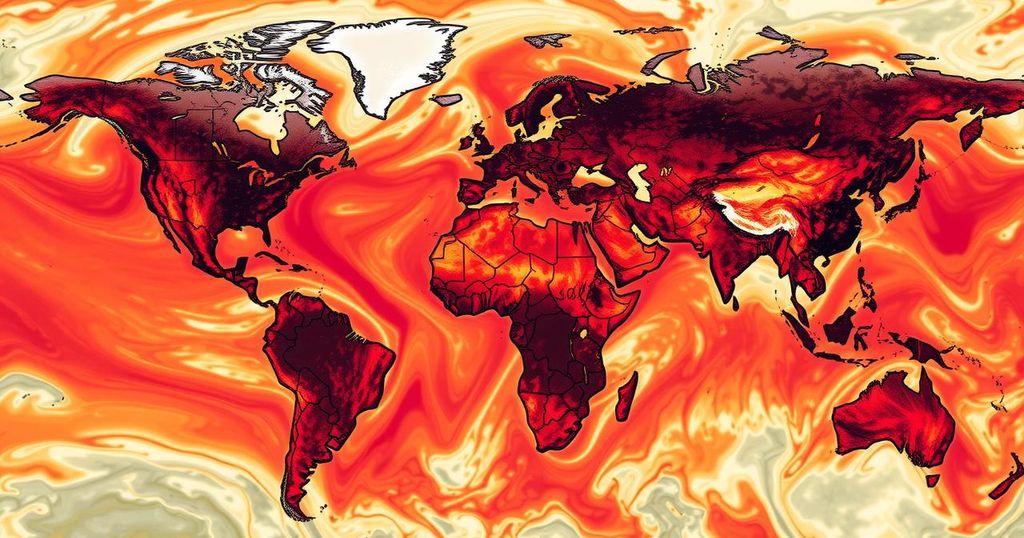In 2024, a comprehensive study revealed that human-driven climate change caused an average of 41 additional days of extreme heat worldwide, potentially marking it the hottest year on record. Researchers linked severe weather events to climate change, emphasizing the urgent necessity for global action to address rising temperatures and their associated dangers. Vulnerable communities were most affected by this unprecedented heat, while the effects of climate change threaten the lives and livelihoods of millions.
In 2024, the world endured an average of 41 additional days of hazardous heat, attributed to human-induced climate change, as reported by a group of scientists. The comprehensive analysis by researchers from World Weather Attribution and Climate Central indicated that this year is likely to be the hottest recorded, alongside a series of extreme weather events that devastated numerous regions globally. “Climate change did play a role, and often a major role in most of the events we studied, making heat, droughts, tropical cyclones, and heavy rainfall more likely and intense across the world,” stated Friederike Otto, the lead scientist at World Weather Attribution.
The impact of the severe heat affected millions, with regions like Northern California and Death Valley experiencing extreme temperatures, while Mexico and Central America faced scorching daytime conditions. Vulnerable populations, including children in West Africa, encountered heightened health risks. Notably, Southern Europe saw temperatures rise to alarming levels, prompting Greece to suspend activities at the Acropolis. In South and Southeast Asia, schools closed due to the oppressive heat.
The scientists compared global daily temperatures for 2024 with those expected in an unchanged climate scenario. Some regions experienced over 150 days of extreme heat. Kristina Dahl from Climate Central noted that the most severely affected areas were often the least developed, confronting even more intense heat conditions. This year served as a stark reminder of the impending threat of surpassing the Paris Agreement’s 1.5 degrees Celsius (2.7 degrees Fahrenheit) limit relative to pre-industrial averages, as 26 of the 29 reviewed extreme events were linked to climate change.
Although the El Niño weather pattern contributed to some extremes earlier in the year, the significant climatic impact was primarily due to climate change. Jennifer Francis, a climate scientist at the Woodwell Climate Research Center asserted that “Extreme weather will continue to become more frequent, intense, destructive, costly, and deadly, until we can lower the concentration of heat-trapping gases in the atmosphere.”
The recent findings indicate that without rapid and effective action against climate change, the frequency and severity of future extremes are only set to increase. However, proactive adjustments can mitigate potential damages, according to Julie Arrighi of the Red Cross Red Crescent Climate Centre.
According to the analysis, the realities of climate change demand urgent collective actions amongst nations to adapt and prepare for its pervasive impacts.
The discussion surrounding climate change has gained urgency as its repercussions on weather patterns and global temperatures have become increasingly pronounced. The recent analysis highlighted how human activities, primarily through fossil fuel combustion, have exacerbated heat waves and other extreme weather occurrences. This report marks a significant contribution to understanding the intricacies of climate change’s impact on both human health and ecological systems, while underscoring the correlation between rising temperatures and numerous severe weather events globally. Particularly concerning is the realization that vulnerable populations face the brunt of these challenges, highlighting the necessity for global action and adaptation strategies.
In summary, the findings indicate that climate change has contributed significantly to extreme heat and other weather-related disasters globally in 2024. The evidence presented reveals that many weather events correlating with climate change resulted in loss of life and livelihoods, particularly in underdeveloped regions. As humanity approaches critical temperature thresholds, urgent measures and adaptations must be implemented to minimize future impacts and ensure global resilience to climate change.
Original Source: www.theweek.in






